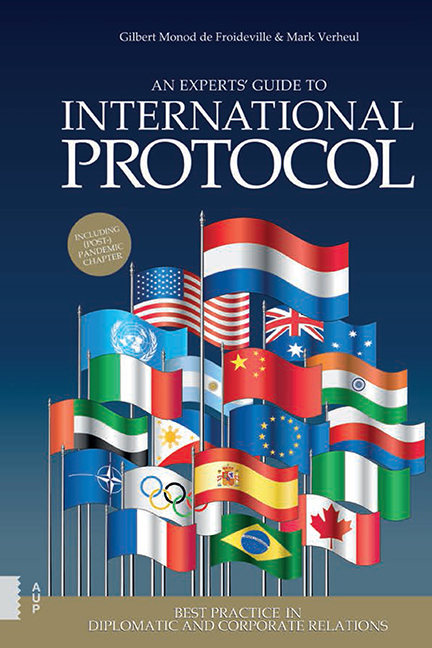Book contents
- Frontmatter
- Contents
- Preface to the original edition by His Royal Highness Prince Carlos de Bourbon de Parme
- Prologue
- Acknowledgements
- 1 International Protocol
- 2 Precedence
- 3 Seating Arrangements and Order of Processions
- 4 Flag Protocol
- 5 Invitations and Dress Codes
- 6 Gifts and Honours
- 7 Ceremonies
- 8 The Protocol Officer
- 9 Guest and Host
- 10 Protocol and Stakeholder Engagement During and after the COVID-19 Pandemic
- Authors’ Biographies
- Bibliography
- Websites
- Illustrations and Photographs
- Index
6 - Gifts and Honours
Published online by Cambridge University Press: 27 May 2021
- Frontmatter
- Contents
- Preface to the original edition by His Royal Highness Prince Carlos de Bourbon de Parme
- Prologue
- Acknowledgements
- 1 International Protocol
- 2 Precedence
- 3 Seating Arrangements and Order of Processions
- 4 Flag Protocol
- 5 Invitations and Dress Codes
- 6 Gifts and Honours
- 7 Ceremonies
- 8 The Protocol Officer
- 9 Guest and Host
- 10 Protocol and Stakeholder Engagement During and after the COVID-19 Pandemic
- Authors’ Biographies
- Bibliography
- Websites
- Illustrations and Photographs
- Index
Summary
Gifts
During official visits in the international diplomatic world, it is customary to exchange gifts between heads of state, heads of government, diplomats, authorities, delegations, and business partners as a form of respect and recognition. The size of the gifts is often dependent on the country the visit is taking place in and its local customs. In the Middle East, for example, countries give each other lavish gifts at state visits as a symbol of their generosity and respect for one another. In the West, this is much less customary, the meaning of a gift having more importance than its price.
It should also be noted that the exchange of gifts, while private, cannot always be considered as a personal exchange. The head of state concerned represents his or her country during a state visit. For this reason, the gifts received are seen as state property. In some countries, such as the Republic of Indonesia, for example, these gifts are kept at a special state museum. Institutions, ministries, and companies also have special rules and instructions for receiving gifts (e.g. they may cost up to a certain amount). These kinds of rules revolve around integrity in many cases, giving and receiving gifts is disallowed in order to avoid any kind of preferential treatment.
Protocol surrounding the exchange of gifts is different in each country and is often dependent on its respective culture, such as can be seen in Asia. The Japanese, for example, prefer to receive gifts in a small bag. Furthermore, the feelings associated with certain gifts in the culture concerned should be taken into account. For example, a wine decanter would not be an appropriate gift in the Middle East. In China, it is inappropriate to give a letter opener as a gift, as is giving a clock to an elderly person. White or yellow flowers should also not be given as gifts, as these are associated with death.
During the preparation of an official visit, it is recommended to go through the gift exchange ceremony with the receiving party beforehand.
- Type
- Chapter
- Information
- An Experts' Guide to International ProtocolBest Practices in Diplomatic and Corporate Relations, pp. 165 - 182Publisher: Amsterdam University PressPrint publication year: 2021



